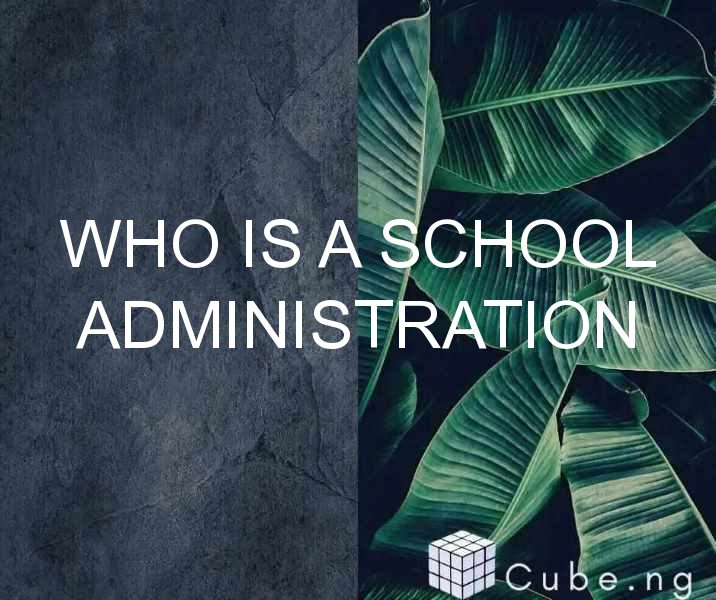Table of Contents
- Who Is A School Administration: Understanding Their Role and Responsibilities
- What is School Administration?
- Who is a School Administrator?
- Roles and Responsibilities of a School Administrator
- Managing School Resources
- Hiring and Managing Staff
- Ensuring Curriculum Implementation
- Ensuring Compliance with Regulations
- Ensuring the Safety of Students and Staff
- Managing Parent and Student Relations
- Managing School Facilities
- Ensuring Effective Communication
- Leading Professional Development Programs
- Ensuring Continuous Improvement
- Qualities of an Effective School Administrator
- Final Thoughts
Who Is A School Administration: Understanding Their Role and Responsibilities
As students, we remember our school as a place of learning, growth, and fun. However, behind the scenes, a team of people work tirelessly to ensure the smooth running of the school. One of the most critical players on this team is the school administration.
What is School Administration?
School administration refers to the management of educational institutions, which includes planning, organizing, directing, and controlling the activities of the school. It involves overseeing all aspects of the school, such as finances, facilities, staff, and students, to ensure that the school is functioning optimally.
Who is a School Administrator?
A school administrator is an individual who has the responsibility of managing the day-to-day operations of a school. They are responsible for ensuring that the school is running smoothly, and that all staff, students, and parents are satisfied with the services that the school is providing.
Roles and Responsibilities of a School Administrator
Managing School Resources
One of the primary roles of a school administrator is to manage the resources of the school. This includes managing the budget, ensuring that funds are allocated appropriately, and making sure that the school has the necessary resources to operate effectively.
Hiring and Managing Staff
Another crucial responsibility of a school administrator is to hire and manage the staff. This involves recruiting, interviewing, and hiring new staff, as well as managing the existing staff members. The school administrator is responsible for ensuring that the staff members are motivated and performing their duties efficiently.
Ensuring Curriculum Implementation
The school administrator is also responsible for ensuring that the curriculum is implemented effectively. This involves monitoring the teaching and learning process and ensuring that the necessary resources are available for the students and teachers.
Ensuring Compliance with Regulations
The school administrator is responsible for ensuring that the school complies with all the necessary regulations. This includes ensuring that the school meets all the state and federal regulations, as well as ensuring that the school's policies and procedures are followed.
Ensuring the Safety of Students and Staff
The safety of students and staff is a top priority for the school administrator. They are responsible for implementing policies and procedures that ensure that the school is a safe and secure environment for everyone who enters the premises.
Managing Parent and Student Relations
The school administrator is also responsible for managing parent and student relations. They must ensure that parents and students are satisfied with the services that the school is providing and that their concerns are addressed promptly.
Managing School Facilities
The school administrator is responsible for managing the school's facilities. This includes ensuring that the school's buildings and grounds are well-maintained, that the necessary repairs are carried out, and that the school is equipped with the necessary resources.
Ensuring Effective Communication
Effective communication is critical in any organization, and the school is no exception. The school administrator is responsible for ensuring that there is effective communication between staff, students, parents, and other stakeholders.
Leading Professional Development Programs
The school administrator is responsible for leading professional development programs for staff members. This includes organizing workshops, training sessions, and other programs that help staff members enhance their skills and knowledge.
Ensuring Continuous Improvement
Finally, the school administrator is responsible for ensuring continuous improvement in the school. This involves evaluating the school's performance and implementing measures that will help the school improve and meet its objectives.
Qualities of an Effective School Administrator
To be effective in their role, a school administrator must possess certain qualities. Some of these qualities include:
Strong Leadership Skills
The school administrator must be a strong leader who is capable of inspiring and motivating staff members, students, and parents.
Excellent Communication Skills
The school administrator must be an excellent communicator who can convey information effectively to different stakeholders.
Effective Problem Solving Skills
The school administrator must have strong problem-solving skills and be able to make decisions that are in the best interest of the school.
Good Organizational Skills
The school administrator must be well-organized and able to manage multiple tasks simultaneously.
Strong Interpersonal Skills
The school administrator must have strong interpersonal skills and be able to build positive relationships with staff, students, and parents.
Sound Judgement
The school administrator must have sound judgment and be able to make decisions that are in the best interest of the school.
Final Thoughts
In conclusion, the school administrator plays a critical role in the smooth running of a school. They are responsible for managing the day-to-day operations of the school, ensuring that the school is operating optimally, and that staff, students, and parents are satisfied with the services that the school is providing. To be effective in their role, a school administrator must possess certain qualities such as strong leadership skills, excellent communication skills, effective problem-solving skills, good organizational skills, strong interpersonal skills, and sound judgment.




